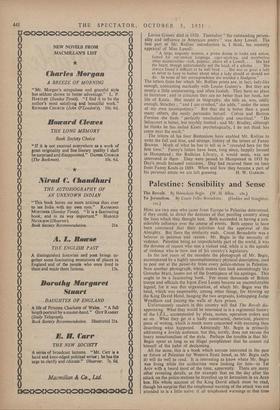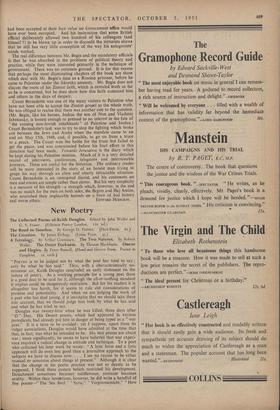Palestine: Sensibility and Sense
The Revolt. By Menachem Begin. (W. H. Allen. t8s.)
HERE are two men who came from Europe to Palestine determined, if they could, to direct the destinies of that puzzling country along the lines which they thought best. Both succeeded in having a con- siderable influence over the course of events. Both appear to have been convinced that their activities had the approval of the Almighty. But there the similarity ends. Count Bernadotte was a believer in patience and reason ; Mr. Begin in the necessity of violence. Palestine being an unpredictable part of the world, it was the devotee of reason who met a violent end, while it is the apostle of violence who is now one of his country's legislators.
In the last years of the mandate the photograph of Mr. Begin, accompanied by a highly uncomplimentary physical description, used to peer out at the passer-by from every police-station in Palestine. Now another photograph, which makes him look astonishingly like Groucho Marx, looms out of the frontispiece of his apologia. This ought to be a fascinating book. For many thousands of British troops and officials the Irgun Zwei Leumi became an uncomfortable legend, for it was this organisation, of which Mr. Begin was the head, which was responsible, among other things, for blowing up the King David Hotel, hanging the two sergeants, kidnapping Judge Wyndham and forcing the walls of Acre prison.
Unfortunately readers in this country will find The Revolt dis- appointing. What they would be interested in is a regimental history of the I.Z.L., accompanied by plans, names, operation orders and so on. What they get is a badly constructed, rhetorical, plaintive piece of writing, which is much more concerned with excusing than describing what happened. Admittedly Mr. Begin is primarily addressing a Jewish audience, but this, surely, does not excuse the heavy sensationalism of the style. Perhaps the trouble is that Mr. Begin spent so long as an illegal pamphleteer that he cannot rid himself of the habit of declaiming.
All the same, this is a book which anyone interested in the past or future of Palestine (or Western Eretz Israel, as Mr. Begin calls it) will do well to read. It is interesting to know where Mr. Begin was living while the authorities were looking for him—in Tel Aviv with a beard most of the time, apparently. There are many other revealing details, as for example that on the day after the attack on the police-stations he travelled up to Jerusalem in an Arab bus. His whole account of the King David attack must be read, though his surprise that the telephoned warning of the attack was not attended to is a little naïve: if all telephoned warnings at that time had been accepted at their face value no Government office would have ever been occupied. And his insinuation that some British official deliberately allowed two hundred of his colleagues (and himself ?) to be blown up in order to discredit the terrorists shows that he still has very little conception of the way his antagonists' minds worked.
The real difference between Mr. Begin and the mandatory officials is that he was absorbed in the problems of political theory and practice, while they were interested primarily in the technique of government. There was no common ground. It is for this reason that perhaps the most illuminating chapters of the book are those which deal with Mr. Begin's time as a Russian prisoner, before he came to Palestine under the Sikorsky amnesty. Mr. Begin does not discuss the roots of his Zionist faith, which is revealed truth as far as he is concerned, but he does show how this faith sustained him and others in the days of despair.
Count Bernadotte was one of the many visitors to Palestine who have not been able to accept the Zionist gospel as the whole truth. He was obliged to realise that there was another side to the question. (Mr. Begin, like his heroes, Joshua the son of Nun and Vladimir Jabotinsky, is honest enough to pretend to no interest in the fate of "the existing non-Jewish inhabitants" of Palestine and Jordan.) Count Bernadotte's task was to try to stop the fighting which broke out between the Jews and Arabs when the mandate came to an end on May 15th, 1948, and, if possible, to go on from a truce to ,a peace. The Count won the battle for the truce but failed to get the peace, and was assassinated before his final effort in this direction had been made. Towards Jerusalem is the diary which he kept during his Palestine mission. Much of it is a very detailed record of interviews, conferences, telegrams and interminable journeys. These are useful for the historian. The ordinary reader will be more interested in the story of an honest man trying to grope his way through an alien and utterly intractable situation. Count Bernadotte is an uninspired diarist, and his comments on men and events are simple rather than clever. But his very simplicity is a measure of his strength—a strength which, however, in the end was no match for the men on both sides, the Begins and Haj Amins, who nourished their implacable hatreds on a brew of bad history






















































 Previous page
Previous page